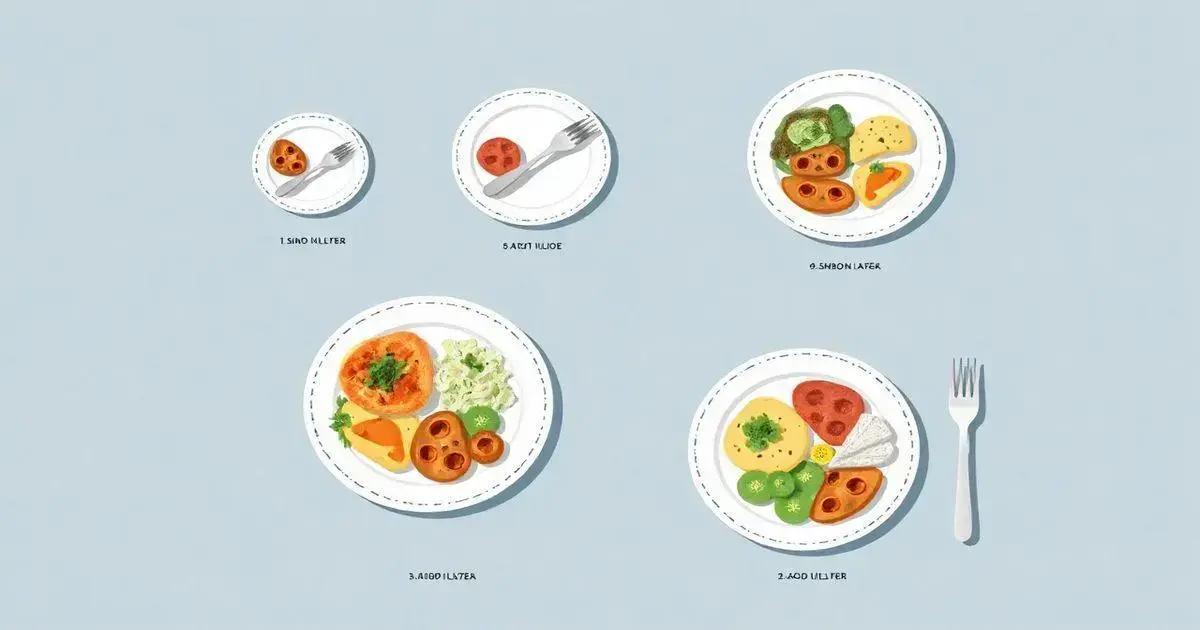To reduce overeating with mindful portion sizes, practice awareness during meals by using smaller plates, listening to hunger signals, and eliminating distractions. Mindful eating enhances enjoyment, promotes better digestion, and supports emotional well-being, making it an effective strategy for healthier eating habits.
Are you struggling with overeating? Learning how to reduce overeating with mindful portion sizes can be a game changer. Mindful eating encourages awareness of what you consume, allowing you to savor each bite and truly enjoy your meals. In this article, we will delve into the concept of mindful eating, explore the psychology behind portion control, and provide practical tips to help you adopt mindful portion sizes. Discover the benefits of these practices and how they can transform your relationship with food.
Understanding Mindful Eating

Understanding Mindful Eating is important for anyone looking to improve their relationship with food. Mindful eating involves being fully present during meals and recognizing the physical and emotional cues of hunger and satiety. Rather than eating mindlessly while distracted, this approach encourages you to focus on the flavors and textures of your food.
One key aspect of mindful eating is listening to your body. Ask yourself, Am I really hungry? If the answer is yes, assess how hungry you really are. Remember that it’s okay to eat when you’re hungry; it’s all about balance.
Practicing Mindfulness
To practice mindful eating, try to eliminate distractions. Turn off the television, put your phone away, and sit down at a table. Take a moment to appreciate your food before you start eating. Look at its color and arrangement. Smell the aromas and take a bite.
As you chew, savor each mouthful. Notice how the food feels in your mouth and how the flavors change as you eat. This practice not only enhances your dining experience but also helps you realize when you are full, preventing overeating.
The Role of Portion Sizes
Mindful eating also emphasizes the importance of portion sizes. By serving smaller portions, you can enjoy your meals without the pressure of eating too much. Using smaller plates can trick your mind into feeling satisfied with less food.
Combining mindful eating with appropriate portion sizes makes it easier to recognize when you are satisfied. This can lead to healthier eating habits and improve your overall well-being.
Emotional Connections to Food
It’s also essential to understand the emotional connections we have with food. Many people turn to food for comfort during stress or sadness. By practicing mindful eating, you can identify these triggers and learn to address your emotions without food. This skill can prevent emotional overeating and promote healthier coping mechanisms.
The Psychology of Portion Control

The Psychology of Portion Control is a vital aspect to understand when working to reduce overeating. Our brain plays a significant role in how we perceive and respond to food. Research shows that our environment and even our mindset can influence how much we eat.
When it comes to portion sizes, larger servings can lead us to consume more. This is known as the portion size effect. Our brains can easily adjust to larger portions over time, making it challenging to recognize what a healthy serving size looks like. To combat this, using smaller plates and bowls can help our brains feel satisfied with less food.
Mindful Awareness
Being aware of your portions starts with being mindful. Focus on how your body feels before, during, and after meals. Do you feel content? Are you still hungry? Practicing mindfulness can enhance this awareness and allow you to listen to your body’s signals.
Visual cues also affect our food consumption. When food is presented in a larger bowl, we are likely to serve ourselves more. It’s important to adjust our serving sizes based on the plate or bowl we are using. By using smaller dishes, you can trick your brain into feeling satisfied with a healthy amount.
Emotional Triggers
Many people eat in response to emotions such as stress, boredom, or sadness. Understanding these triggers can help separate emotional eating from true hunger. Keep a food journal to track what you eat and when. This can reveal patterns and help you make more mindful choices about your portions.
Education about portion sizes is also crucial. Learning what appropriate portions look like can empower you to make better choices. Use measuring cups or a food scale until you feel confident in determining your ideal portion sizes.
Social Influences
Social settings can significantly influence how much we eat. Friends and family can impact our choices without us even realizing it. Being aware of this pressure can help you stick to your plans for portion control, even when dining out or at social gatherings. You can try to focus on conversations and enjoying time with others rather than the amount of food on your plate.
Practical Tips for Mindful Portion Sizes

Practical Tips for Mindful Portion Sizes can help you enjoy your meals without overeating. Here are some simple strategies to incorporate into your daily eating habits.
1. Use Smaller Plates: Using smaller plates can give you the illusion of a full plate. When your plate looks full, your brain thinks you’ve eaten enough. This method can help control your portion sizes without feeling deprived.
2. Serve Portions Wisely: Instead of placing entire pots of food on the table, serve individual portions. This prevents you from mindlessly going back for seconds or thirds.
3. Measure Your Food
Using measuring cups or a kitchen scale can help you understand what a standard portion looks like. Measuring your food initially will help you learn to eyeball portions accurately over time.
4. Pay Attention to Hunger Cues: Before you eat, ask yourself if you are really hungry. Eat slowly and check in with your body as you eat. Pause after a few bites to see if you’re still hungry.
5. Fill Up on Vegetables
Vegetables are low in calories and high in nutrients. Fill half your plate with vegetables to add volume without adding too many calories. This way, you can still enjoy your meal while managing portion sizes.
6. Be Mindful While Eating: Eliminate distractions when eating. Avoid watching TV or scrolling through your phone. Focus on your meal to enhance enjoyment and awareness of how much you’re consuming.
7. Practice Gratitude
Taking a moment to appreciate your food can boost satisfaction. Being grateful can lead to a deeper appreciation of the meal, allowing you to feel satisfied with less.
8. Share Meals: When dining out, consider sharing a meal with a friend. This way, you can enjoy the experience without overindulging. You can also take home leftovers for another meal.
The Benefits of Mindful Eating Practices

The Benefits of Mindful Eating Practices are numerous and can significantly enhance your overall health and well-being. By adopting mindful eating, you create a positive relationship with food that supports a healthier lifestyle.
One primary benefit is weight management. Mindful eating encourages you to pay attention to your hunger and fullness signals. By tuning into your body, you are less likely to overeat and more likely to maintain a healthy weight.
Improved Digestion
Eating slowly and savoring your food can lead to better digestion. When you take the time to chew and appreciate your meal, your body processes food more effectively. This can reduce issues like bloating and indigestion.
Enhanced Satisfaction is another key benefit. Mindful eating allows you to truly enjoy your meals. This appreciation can lead to greater satisfaction, requiring smaller portions to feel content. Over time, this reduces the urge to snack mindlessly between meals.
Better Emotional Well-Being
Mindful eating can also promote emotional well-being. It fosters a deeper connection to your food and its nutritional value. This awareness can lead to healthier choices and an overall positive attitude toward eating, reducing guilt often associated with food.
Increased Awareness of Food Choices teaches you about nutrition. As you focus on what you eat, you become more aware of the quality of your food. This knowledge can help you make better choices that nourish your body.
Social Connections
Mindful eating practices can improve your social interactions around food. By engaging with others over meals in a focused way, you foster meaningful connections. Enjoying food without distractions enhances the dining experience, making meals more enjoyable.
Lastly, practicing mindfulness daily can help combat emotional eating. By being aware of why you eat, you can distinguish between physical hunger and emotional triggers. This insight empowers you to choose healthier eating habits.
In Conclusion: Embracing Mindful Eating for a Healthier Lifestyle
Adopting mindful eating practices can significantly impact your relationship with food and your overall health. By understanding how to reduce overeating with mindful portion sizes, you can enjoy your meals more fully and become more aware of your body’s needs.
Through practical tips like using smaller plates, paying attention to hunger cues, and appreciating your food, you can make positive changes in your eating habits. The benefits of mindful eating extend beyond weight management, promoting better digestion, emotional well-being, and increased awareness of food choices.
Ultimately, fostering a mindful approach to eating encourages you to enjoy meals more and build healthier relationships with food. By committing to these practices, you can create a sustainable lifestyle that supports your goals and enhances your quality of life.
FAQ – Frequently Asked Questions about Mindful Eating Practices
What is mindful eating?
Mindful eating is the practice of being fully present while eating, paying attention to the flavors, textures, and your body’s hunger and satiety cues.
How can mindful eating help with weight management?
Mindful eating encourages awareness of portion sizes and hunger cues, reducing the chances of overeating and helping maintain a healthy weight.
What are some practical tips for practicing mindful eating?
Some tips include using smaller plates, serving portions wisely, eating slowly, and eliminating distractions during meals.
How does portion control relate to mindful eating?
Portion control is a crucial element of mindful eating, as it helps you recognize when you are satisfied and prevents overeating.
Can mindful eating improve my emotional well-being?
Yes, mindful eating can promote a positive relationship with food, reducing guilt and improving your emotional connection to meals.
What benefits can I expect from adopting mindful eating practices?
Benefits include better digestion, enhanced satisfaction with meals, improved weight management, and a greater awareness of nutritional choices.













